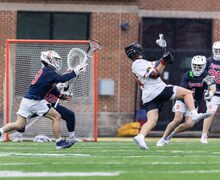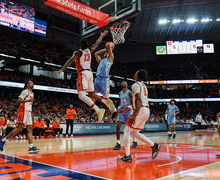Guitarists share Brazilian culture with Slocum Auditorium
Jacob Greenfeld | Asst. Photo Editor
Ricardo Peixoto played a seven-string guitar Tuesday night, joined by Edinho Gerber and Rogério Souza to form a Brazilian guitarist trio in Slocum Auditorium.
Edinho Gerber had just finished nearly an hour of maddening work on his guitar when he was approached by an adoring fan.
“I just need to see your calluses, because there were a few times when I thought, ‘Oh, that has got to hurt,’” the woman said.
Gerber responded with a laugh, saying nylon strings aren’t too tough on his fingers.
“I just had a little bit of fried chicken grease,” he joked, pretending to reach into his back pocket to rub on a little more of the imaginary fat.
The exchange acted as pleasant closure after Gerber and two other Brazilian guitarists, Ricardo Peixoto and Rogério Souza, wowed Slocum Auditorium on Tuesday night with an evening of music presented by the department of art and music histories. The event was organized by Silvia Lazo, an SU professor and a Brazilian woman herself, and promoted by the students in her Music in Latin America class.
Lazo knows there are endless ways to learn about other cultures. But one way or another, she said, you’re going to “migrate into some cultural art form.” Tuesday night, that art form was embodied by sound.
“So much of the music is connected to the history of that country and to the political situation,” Lazo said. “It’s part of our whole world history, really.”
The trio’s music itself provided a mini history lesson. During the middle of the set, Gerber explained they were playing a few pieces written by legendary Brazilian composer Pixinguinha — the man who is credited with giving birth to samba music. He talked about the fact that Pixinguinha would be 120 years old this year, but even with his legacy going so far back, it’s still very much alive, an inspiration for what he and his colleagues do.
“His music is simultaneously simple and ultra-difficult,” Gerber said.
To an outsider’s ear, the simplicity was hardly recognizable. All three musicians plucked away at their strings with composed fury for nine songs. Gerber played a six-string guitar, while Peixoto and Souza each had seven. They stayed seated for the entirety, their bodies locked in on the music. Between the three of them, they shared just one music stand. For most of the show, it stayed with Peixoto. For a short time, Souza claimed ownership.
“This is called sharing,” Peixoto joked before passing the stand mid-set. “Fortunately, we all get along.”

Jacob Greenfeld | Asst. Photo Editor
The dynamic of a trio was one both Peixoto and Gerber admitted to be complex. Peixoto said after the show that playing solo is a lot of work. A very specific repertoire has to be worked out. In a duo, more freedom to improvise surfaces. But add a third player to make a trio, and the game changes.
“When you’re talking about a trio of the same instrument — of guitar or some other kind of chordal instrument — then you’re dealing with a whole different bag of worms,” Gerber said. “Because they’re all very similar, how you play the songs is similar, so you have to be always aware of what the other guys are doing.”
Often during the show, Gerber, positioned in the middle of his Peixoto and Souza, would shake his luscious locks of hair out of his face to glance at one of the flanking players. Their eyes would connect, and they would communicate a message without uttering a word.
“Ears are always 100 percent listening to what the other guys are doing” Gerber added. “Sometimes a lot of it is off the cuff and improvised. We’re looking at each other, saying ‘You go ahead,’ ‘No, you go ahead.’”
But beyond just technical skills, the three Brazilian musicians engaged in an effort to share their culture. Peixoto is from Rio de Janeiro. Souza has worked as a producer with top-shelf Brazilian recording artists. Gerber, born to a Brazilian mother and an American father, spent his childhood in both countries.
Peixoto mentioned how the three of them know they aren’t usually playing to a crowd of people well-versed in Brazilian music. But saying “Brazilian music” is like saying “American music” — there are so many genres encompassed within it. Tuesday night contained samba and bossa nova, just to name a few. Gerber called the trio “musical ambassadors.”
“If we can just offer glimpse — just the tip of the iceberg — of what Brazilian music is and can be, that’s great,” Gerber said. “Because it’s such a rich culture and really specific.”
The hexagonal walls trapped the ambience of the dark room, but the liveliness of the trio’s natural overlap kept everyone actively engaged. Lazo said she wanted to make the show intimate yet accessible. Considering the trio walked off the stage of a fairly packed Slocum Auditorium to a standing ovation, it’s hard to argue she didn’t accomplish her goal.
Published on April 4, 2017 at 11:25 pm
Contact: jtbloss@syr.edu | @jtbloss





